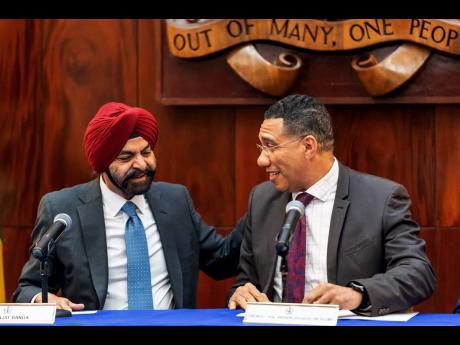Int’l partners helping to lift J’cans out of poverty – PM
The Andrew Holness Administration has turned to its international financial partners for assistance in “lifting Jamaicans out of poverty”, declaring that the current economic stability alone would not achieve this.
Speaking ahead of a closed meeting with World Bank President Ajay Banga at the Office of the Prime Minister in St Andrew, Holness said while Jamaica had achieved economic stability, poverty remained a challenge for the country and had worsened with the onset of the coronavirus pandemic.
“We have never taken our eyes off the ultimate goal of lifting every single Jamaican out of poverty. The IDB (Inter-American Development Bank) and World Bank have been constant partners with us on this journey,” he said.
Holness said the Government’s challenge is to leverage this economic stability to support a pipeline of investments through partnership with the private sector to bring about infrastructural changes and increase economic good.
“…We don’t take it for granted that this will automatically result in a reduction in poverty. The Government has to be very deliberate and instrumental in structuring programmes that will lift people out of poverty, and the World Bank and the IDB have credible experience, knowledge, and, of course, [financial] resources to assist us in crafting programmes that will deal with poverty – be it informational dimension, income dimension, and the access to services,” he said.
Added to that, he said that his administration is seeking to work closely with the international financial institutions to navigate the “multiple overhanging crises” limiting state institutions.
Holness said that with the deep reforms undertaken to strengthen the country’s economic and financial systems, his Government must now contemplate deeper reforms of institutions and public administration.
He said digitisation is another aspect of the reform that needs to take place in these institutions.
The prime minister said the Government has been partnering with the IDB to establish the digital identity scheme known as NIDS and “intends to work closer with the World Bank to ensure that Jamaica becomes a digital society”.
At the same time, he said that it is a widely held view that international financial institutions rely too much on GDP as the main metric for support.
Holness said his administration’s position is that there needs to be a wider set of metrics used to determine how support is given.
“We support and endorse that call, but we also support that countries like Jamaica we must pay it forward in taking charge of our economy to ensure that we are fiscally responsible and that we manage our expenditure well to ensure that we are efficient, that we are competitive, transparent, and that the systems are set a way that corruption cannot flourish in those systems,” he said.
“So we use this platform to endorse the call for a system that looks fairly on countries like Jamaica in terms of how we get access to concessional financing and support,” he added.
Banga, meanwhile, said the strides made by countries to reduce poverty over the years have been cut into in the last four to five years because of the pandemic and rise in interest rates.
He said that with the exception of Jamaica, which has achieved economic stability, a number of countries are currently struggling and that it can only get worse before it gets better.
“It leads to a conclusion that no matter what we do over the next few years, there is not enough money in the multilateral banking system, in the generosity of governments or in the generosity of philanthropists to take out the level of challenges that we all face in our individual spaces,” the World Bank president said.
He said the difference can be made through partnerships with the private sector.
He said limiting the effects of global factors that contribute to poverty requires very serious application of prioritisation and the right levels of capital, which includes the private sector.
Banga said the World Bank can be “most helpful” to Jamaica in three spaces: its assistance in human capital development, digitisation of state institutions, and resiliency.
“If five years from today we can come and look back and say we picked a few things and we go about them well and we replicated them at scale across your country to the benefit of your people, then we would have done a terrific job,” he said.

